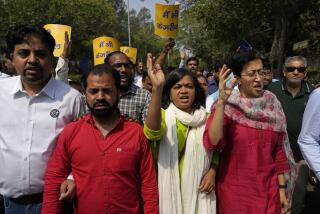Indian activist Anna Hazare ends standoff with government
India’s ruling Congress party, facing one of its biggest political crises in years, spent much of Wednesday negotiating with Anna Hazare, a popular anti-corruption activist who refused to leave his jail cell until he reached a deal early Thursday.
The negotiators’ task wasn’t helped by tens of thousands of his supporters, who gathered in cities and towns across India, chanting, banging pots, waving flags and holding candlelight vigils in support of the septuagenarian devotee of Mohandas Gandhi.
The anti-corruption crusader finally struck a deal with police to hold a 15-day public hunger strike against graft, ending the bizarre standoff at a New Delhi prison where his brief detention had turned into a sit-in protest.
Police had initially given Hazare permission to hold only a three-day public hunger strike, which he refused, but they eventually relented and agreed to allow him to hold a 15-day protest, which was to begin Thursday afternoon.
After he struck his deal with police, the hundreds camped outside the jail erupted in cheers, threw flower petals in the air and shouted “Anna has won!”
The government gained little politically and stood to lose a great deal by arresting Hazare on Tuesday as he was about to launch an anti-graft hunger strike, analysts said. If anything, his stature has risen since he challenged the government and all but forced it to back down. Ministers have been left looking disorganized and defensive as anger has spread.
Although India has enjoyed strong economic growth for a decade, the last few days have underscored public frustration over widespread graft, poor government services and red tape. A series of scandals in recent months in the telecommunications, defense and sports industries, allegedly involving tens of billions of dollars, has intensified discontent.
Tavleen Singh, a columnist for the Indian Express newspaper, said her family had to register some real estate in Delhi courts a few years ago and she went along.
“The lawyer said to us, ‘Either you pay [$250] to get it done or it will take two years,’” she said. “So we paid. It’s incredible; this sort of corruption was right in Delhi. It’s everywhere. Young people are becoming increasingly frustrated. Just to get a driver’s license, you have to bribe someone.”
Hazare has become a catalyst for this grass-roots frustration. Through a series of hunger strikes, he has built support for a controversial bill that would create an ombudsman, or lokpal, empowered to root out high-level corruption. The government has tried to weaken the bill by exempting the prime minister’s office and top judges from its scrutiny and making the post strictly advisory.
Prime Minister Manmohan Singh sought to regain the initiative in a speech Wednesday in Parliament. Singh, 78, has a reputation for integrity and honesty, although he’s come under growing criticism for the many scandals on his watch and for a perception that he’s increasingly out of touch.
“I acknowledge that Anna Hazare may be inspired by high ideals,” Singh told lawmakers to opposition catcalls. But the activist’s approach, he added, is “totally misconceived.”
Despite Hazare’s popularity, even government critics and anti-graft activists question some of his ideas. Placing this much power in a nonelected office that could itself become a conduit for corruption is not necessarily the answer, they say, arguing instead for better law enforcement and governance.
But few can easily dismiss Hazare’s commitment, energy or swelling support.
Also fueling public anger are demographics, analysts said.
“You have a young, rapidly rising middle class that’s changing the country’s politics, as seen with this anti-corruption movement,” said Gurcharan Das, an author and columnist. “This is the trailer of a movie in 2020 when the middle class becomes 50% of the population. It’s a double feature, politics and the economy.”
Outside Tihar prison, thousands of supporters from across political and socioeconomic lines had weathered the August sun Wednesday awaiting Hazare’s release, many chanting “Hail Mother India!” and “Down with corruption!” The site of his detention was not without irony, given that Tihar’s inmates include businesspeople, politicians and a former minister being held on corruption charges.
The crisis had been building for days. The government initially tried to impose 22 restrictions on Hazare’s protest, including limiting his hunger strike to three days and allowing only 5,000 supporters to attend. When he refused, police moved in Tuesday. After they granted him release on bail, he outflanked them by refusing to leave prison, demanding that all protest restrictions be dropped.
Times wire services contributed to this report.
More to Read
Start your day right
Sign up for Essential California for news, features and recommendations from the L.A. Times and beyond in your inbox six days a week.
You may occasionally receive promotional content from the Los Angeles Times.






